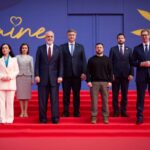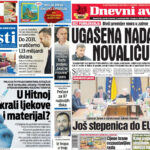- Re-elections to be held in Belgrade
The City Assembly (Skupstina) of the Serbian capital has failed to launch work within the deadline set by law. At the meeting on March 3, which marked the deadline for the new municipal government formation, the oldest elected representative announced in front of an empty hall that there was no quorum, which automatically invoked new elections.
At the latest local elections, held simultaneously with the parliamentary one on December 17, 2023, the ruling Serbian Progressive Party and the Socialist Party of Serbia sealed the largest number of votes and 54 seats in the Belgrade City Assembly. The opposition list “Serbia against violence” came second (43 seats).
The election result sparked outrage on the part of the opposition and civil society activists who took to the streets protesting what they believe was a “rigged vote”. According to their data, Serbian authorities pulled several thousand residents of Bosnia and Herzegovina holding Serbian passports (so-called “phantom voters”) to Belgrade’s polling stations. Protesters stress it is this tool that allowed for falsifying voting results in favor of the ruling forces.
Observers from international organizations also noted violations. In February 2024, MEPs adopted a resolution calling for an independent international inquiry into irregularities in the parliamentary and local elections last December, with a particular focus on the voting in Belgrade.
The decision to hold new elections, but only at the level of the country’s capital, can be seen as a compromise move by Serbian authorities led by Aleksandar Vučić. Belgrade’s concession was unlikely an attempt to come to terms with the opposition but rather an effort to avoid potential sanctions (meaning less funding) from the EU.
- NATO air base deployed in Albania
The grand opening of the NATO air base took place in Kucova (formerly known as Stalin) on March 4.
Located approximately 80 kilometers south of Tirana, the air base will serve Albania and support the Alliance’s logistics, air operations, training, and education efforts.
The Kucova base has become the largest NATO project in Albania over the last decade. NATO allocated about EUR 50 million for the modernization of the facility. The government of Albania laid down over EUR 5 million to this end.
The inauguration of the refurbished Kucova Air Base is part of NATO’s ongoing campaign of strengthening its presence, first of all, in the Western Balkans, but also in South East and East Europe.
- Albania hosts Ukraine – South East Europe Summit
Prime Minister Edi Rama of Albania and Ukrainian President Volodymyr Zelenskyy co-organized on February 28 a large international forum in Tirana, the capital of Albania.
The participants declared their unwavering support for the independence, sovereignty and territorial integrity of Ukraine within its internationally recognized borders as of 1991, and referred to “Russia’s unprovoked military aggression against Ukraine” as the “greatest threat to European security and international peace” and “a blatant violation of international law “.
This is stated in the Summit Declaration, which was supported by Kosovo President Vjosa Osmani, Moldova President Maia Sandu, Montenegro President Jakov Milatović, North Macedonia President Stevo Pendarovski, Serbia President Aleksandar Vučić, Ukraine President Volodymyr Zelenskyy, Prime Minister of Albania Edi Rama, Prime Minister of Bosnia and Herzegovina Borjana Krišto, Prime Minister of Bulgaria Nikolai Denkov, Prime Minister of Croatia Andrej Plenković, and Prime Minister of Romania Ion-Marcel Ciolacu.
The participants also reaffirmed “solidarity with Ukraine and its people in their heroic defense of their freedom and our shared values and expressed our readiness to participate in the implementation of the Peace Formula of President of Ukraine Volodymyr Zelenskyy,” and vowed to “take part in the inaugural Peace Summit.”
In addition, the Declaration emphasizes a “firm commitment” to bringing to justice those “responsible for the crime of aggression, crimes against humanity and other atrocity crimes under international law committed in connection with Russia’s war of aggression against Ukraine.”
At the request of the Serbian president, any references to sanctions against Russia were removed from the Declaration. However, Belgrade did not snub the Declaration in support of Ukraine condemning Russian aggression, which testified to the efforts by Serbia’s authorities to pursue the policy of “sitting on two chairs.”
- Western Balkans, EU officials meet at Tirana summit
Leaders of the Western Balkans met on February 29 for a summit in the Albanian capital to speed up a European Union plan that promises financial aid and a quicker path to membership in exchange for economic reforms.
The growth plan drafted by the EU stipulates that each country shall receive a certain amount of money every six months, depending on the reforms it has implemented over that period. Among the demands put forward by the EU is the creation of a Common Regional Market in the Western Balkans.
The European Union was represented in Tirana by European Commissioner for Enlargement Olivér Várhelyi`, who emphasized that the European Commission aims to halve the implementation deadline for the new “ambitious” plan.
President of Serbia, Aleksandar Vučić, Prime Minister Talat Xhaferi of North Macedonia, Chair of the Council of Ministers of Bosnia and Herzegovina, Borjana Krišto, and the host of the forum, Prime Minister Edi Rama, took part in the summit.
Kosovo’s Prime Minister Albin Kurti, who was also invited to the event, opted for an address via video conference, noting that he could not attend in person due to his visit to the UK, which had been scheduled last year.
Prime Minister Milojko Spajic of Montenegro did not travel to Tirana citing health problems (fever).
Observers claim that the leaders of governments Pristina and Podgorica deliberately ignored the summit due to their disagreement with the EU’s idea of regional integration. It should be recalled that Kosovo and Montenegro are not parties to the Open Balkans initiative, which provides for such integration and currently includes only Serbia, Albania, and North Macedonia.
- Albania, North Macedonia, Serbia cancel employment permits in mutual move
The removal of bureaucratic barriers became possible thanks to the implementation of the Open Balkans regional integration initiative.
In January, the three countries signed two protocols on the integration of their labor markets and systems of electronic identification of citizens. Implementation kicked off on March 1.
The Open Balkans initiative was launched in 2019 when Serbia, Albania and North Macedonia agreed to create a common economic space by opening their borders to citizens, goods, and services.
The Open Balkans initiative faced mixed reactions across the region. Because of Serbia’s leadership in the project, Kosovo is refusing to take any part.
Opinions were divided in Podgorica, but no government authorities formally decided to join the initiative. In Montenegro, which is the leader in terms of European integration in the region, officials believe that regional integration will not contribute to the country’s advancement toward the EU. On the contrary, they suggest it might hinder it, depriving Podgorica of European integration championship.
- Hungary PM Viktor Orban pays unannounced visit to Belgrade
Serbian President Aleksandar Vučić took to Instagram to report a meeting with the head of the Hungarian government.
According to him, the two leaders exchanged views on a range of topics, such as the situation of Kosovo, analyzed economic development plans and progress of joint bilateral projects, and discussed further cooperation.
In addition, the two discussed the rapprochement between the Western Balkans and the European Union.
Challenging times and serious issues are always easier to get through if you share them with honest partners and friends, the Serbian president noted. “I am proud of the relations between the two countries, which are at a historic peak and will not stop there,” Vučić wrote, adding: “Long live Serbian-Hungarian friendship, long live Serbia and Hungary!”
The meeting of the Serbian and Hungarian leaders gave a reason to speculate of a special union between the two countries. Hungary is interested in a regional ally in order to preserve and expand its influence in the Western Balkans, while Serbia, thanks to Hungarian support, expects to continue its policy of ignoring the demands voiced by Brussels regarding foreign policy coordination (primarily, the introduction of restrictive measures against Russia) without the threat of having its European integration progress stalled or facing sanctions (ceased funding) from the EU.
- Republika Srpska President Milorad Dodik visits Montenegro
During a visit to Montenegro, RS President Milorad Dodik met with the head of the Parliament of Montenegro Andrija Mandić. According to him, Dodik handed over to Mandić the draft agreement on “special relationship”, noting that “this is legal and laid down in Constitution of Bosnia and Herzegovina and the Dayton Agreement.”
During his trip to Montenegro, the RS president also mentioned the so-called “Serbian world”, which he referred to as a “phenomenal idea”.
Dodik and Mandić also touched upon the latter’s recent meeting with Russian President Vladimir Putin.
A group of protesters was seen rallying against Dodik’s arrival outside the Parliament of Montenegro. Among the banners held by demonstrators was the following: “Putin’s followers are not welcome.”
Dodik’s trip to Podgorica and his talks with the pro-Russian parliament speaker Mandić immediately after his visit to Russia positions the Bosnian Serb leader as a “liaison” between Moscow and the Western Balkans. Another message is the mention of the “Serbian world” – it is obvious that Dodik and Mandić want to see Montenegro as part of the project. A “special relationship” agreement may be part of this process.
- President Aleksandar Vučić complains of Western pressure on Serbia.
The West needs a government in Serbia that would recognize Kosovo and Metohija, cease support for Republika Srpska, and immediately advocate sanctions against Russia and against economic ties with China, Vucic said in an address to the public on March 2. According to the president, he sees the effort as an intention to set up a “puppet regime” in Serbia.
According to him, the West is exerting pressure through NGOs, politicians, and media, both domestic and regional.
Vučić’s statements are an attempt to pose before his citizens as a leader who cares about the country’s interests and resists Western pressure. At the same time, the opposition, both public and political, is positioned as an anti-Serbian force.
These statements are obviously part of the election campaign, which de facto has already kicked off in Belgrade.



